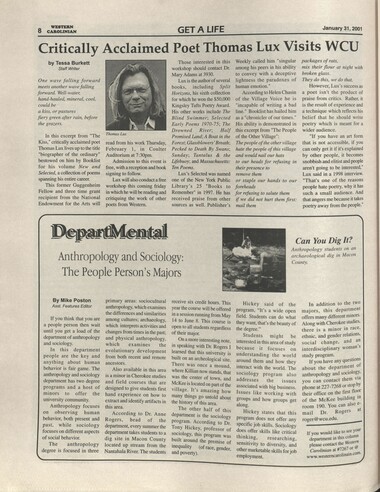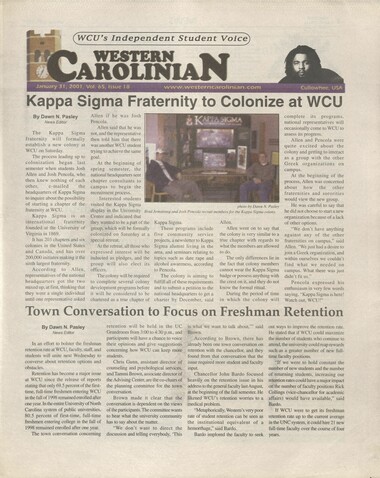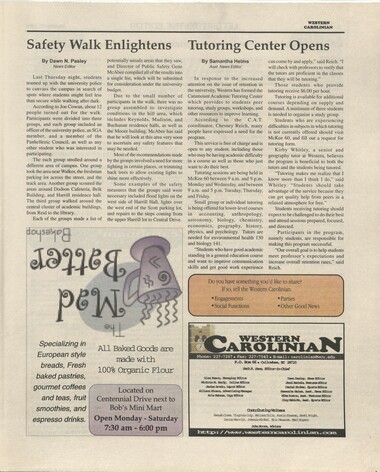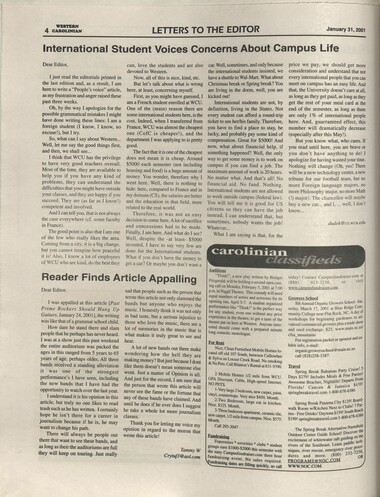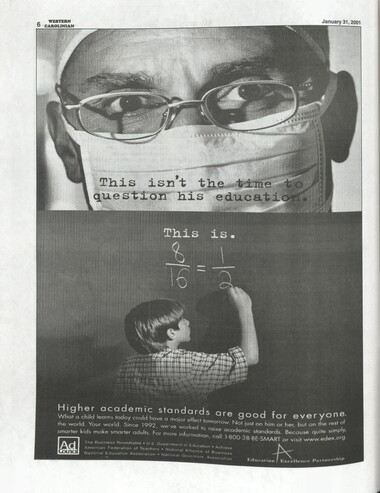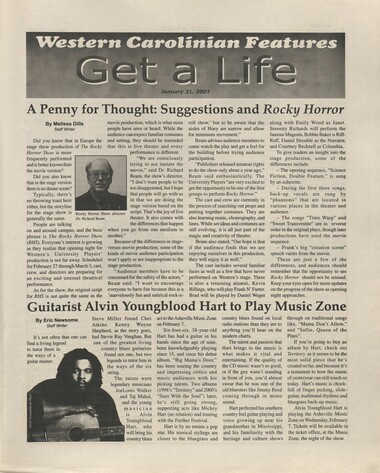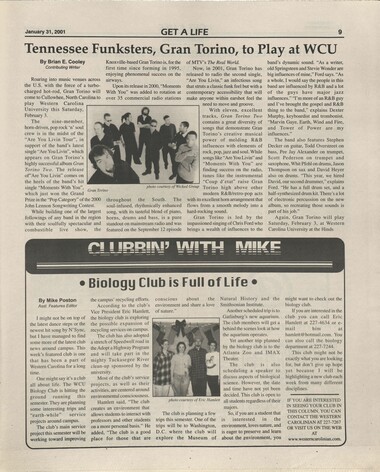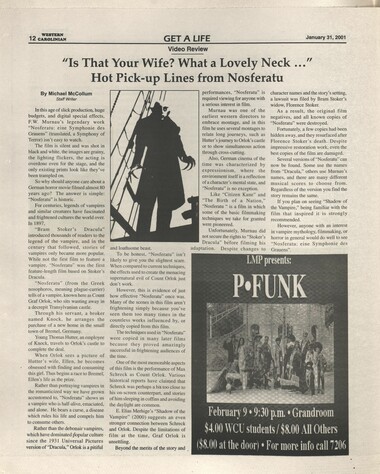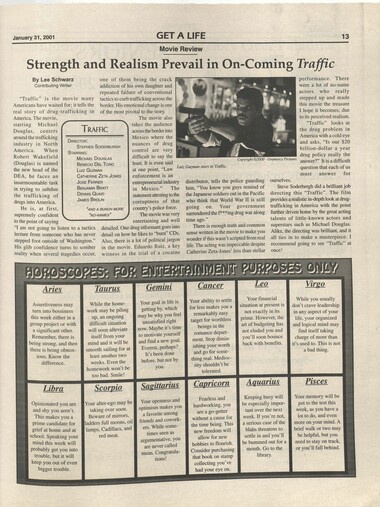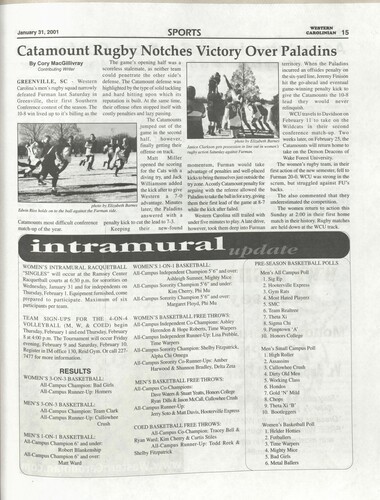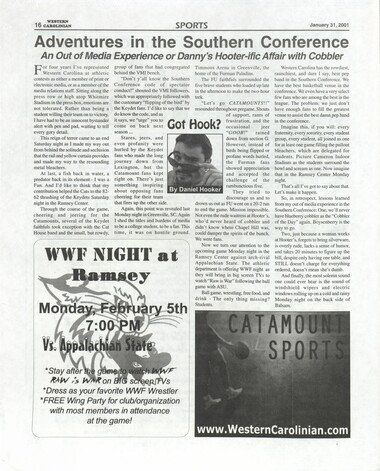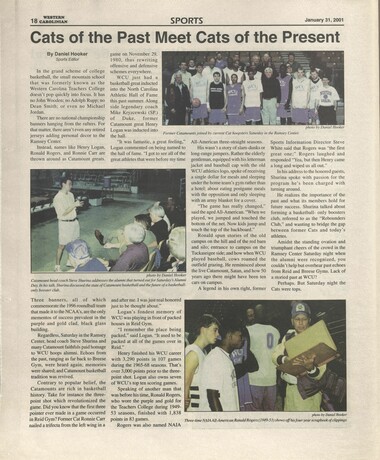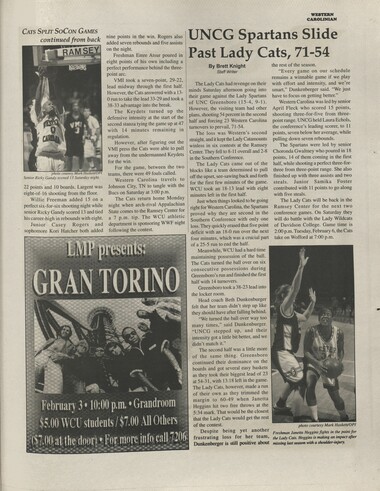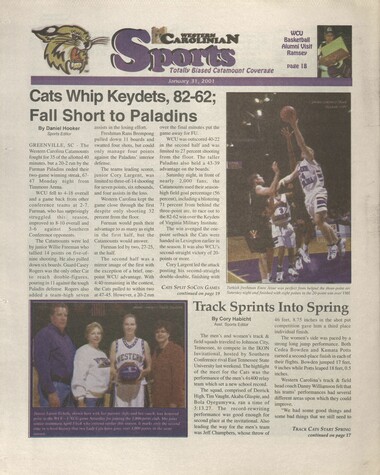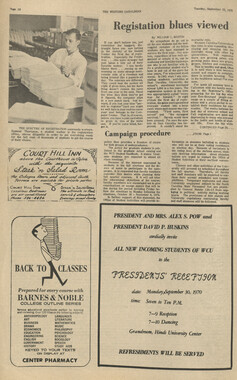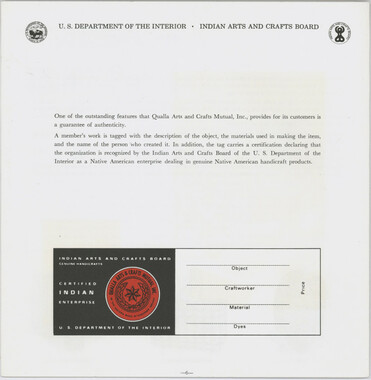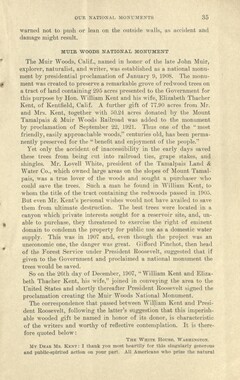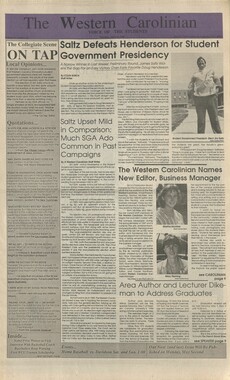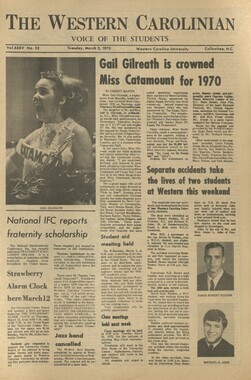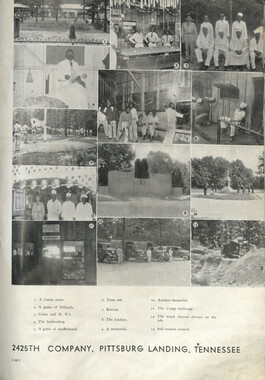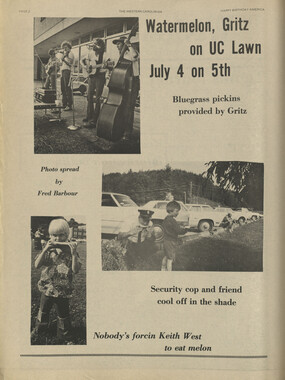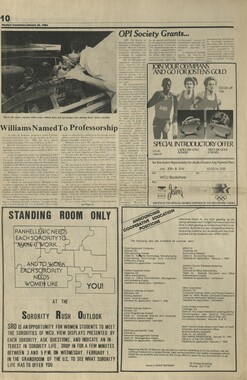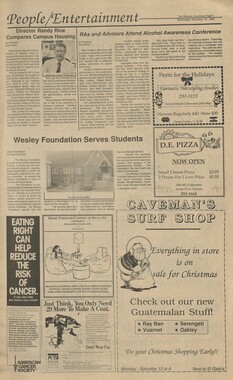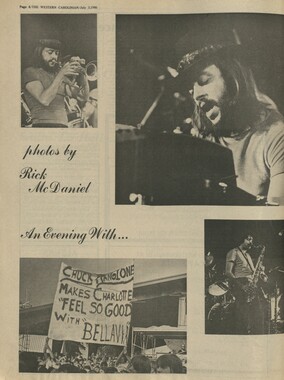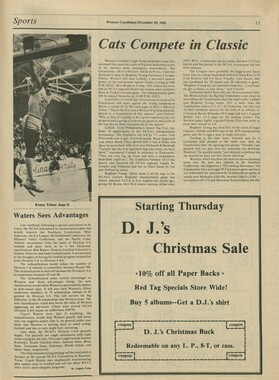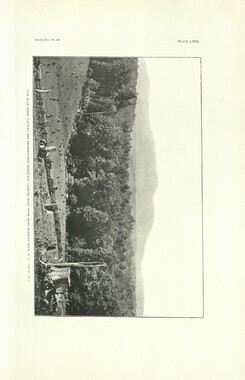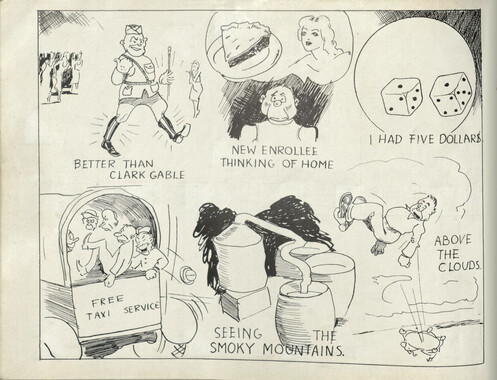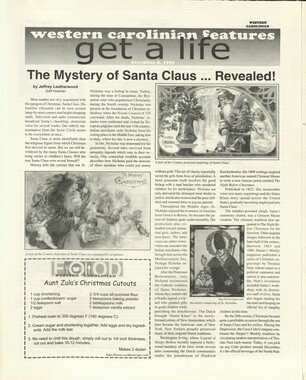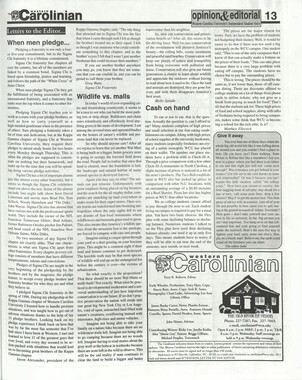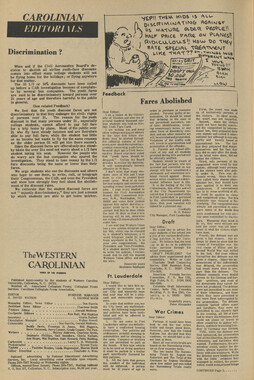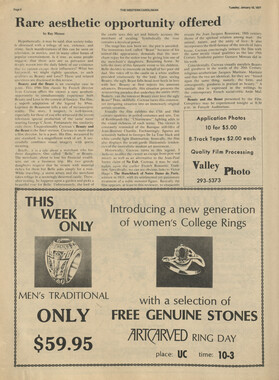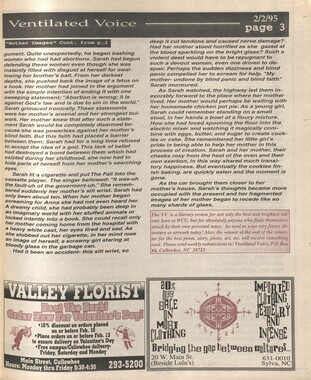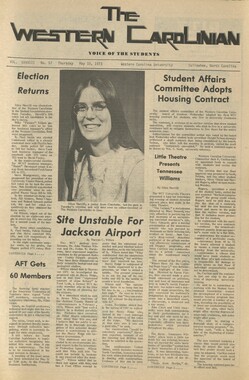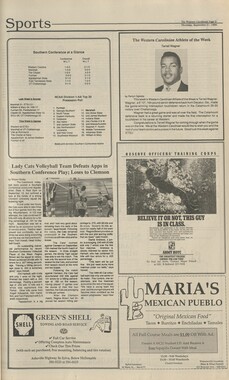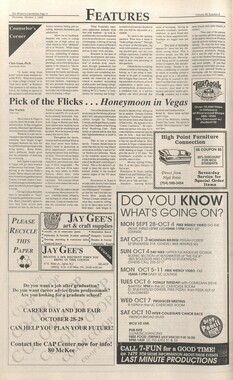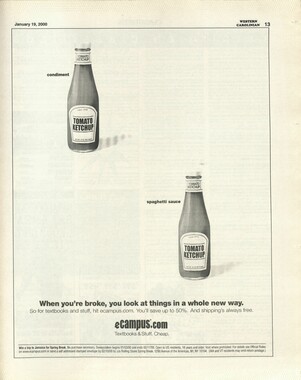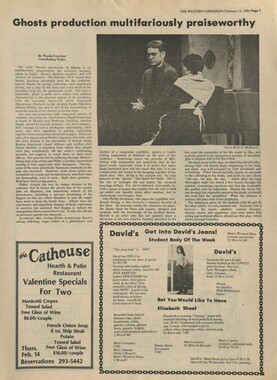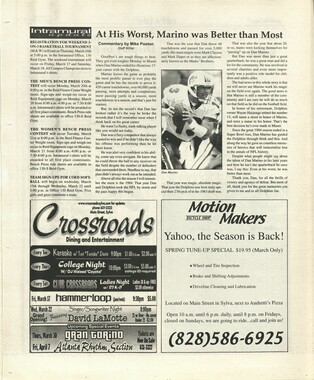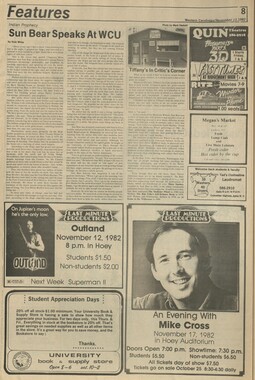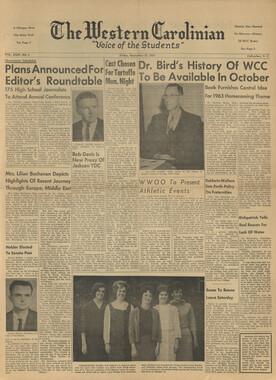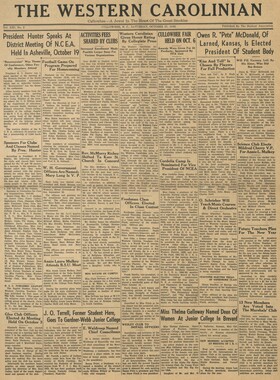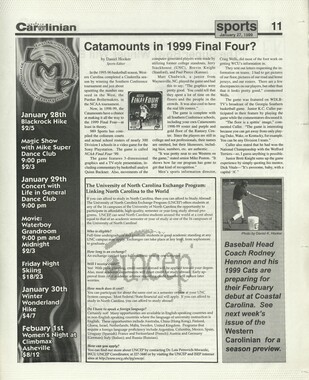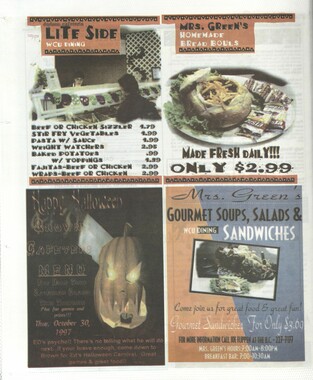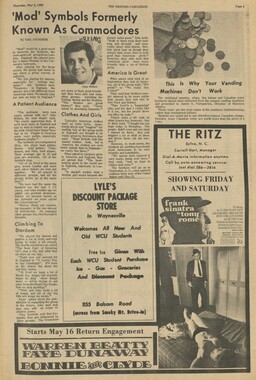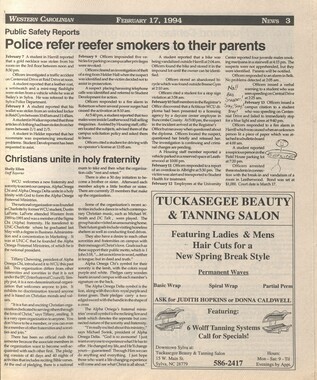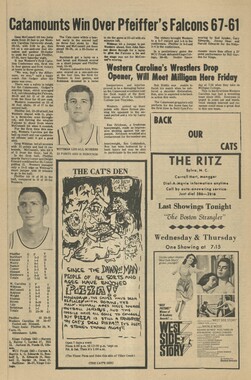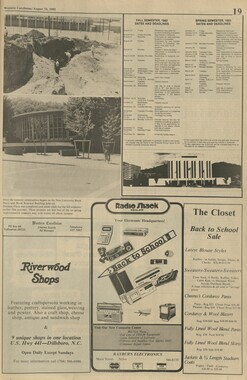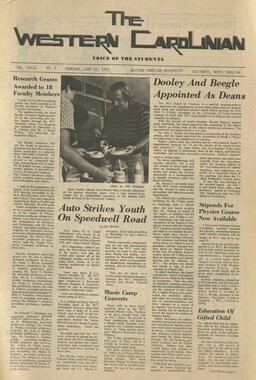Western Carolina University (20)
View all
- Canton Champion Fibre Company (2308)
- Cherokee Traditions (293)
- Civil War in Southern Appalachia (165)
- Craft Revival (1942)
- Great Smoky Mountains - A Park for America (2683)
- Highlights from Western Carolina University (430)
- Horace Kephart (941)
- Journeys Through Jackson (154)
- LGBTQIA+ Archive of Jackson County (15)
- Oral Histories of Western North Carolina (314)
- Picturing Appalachia (6679)
- Stories of Mountain Folk (413)
- Travel Western North Carolina (160)
- Western Carolina University Fine Art Museum Vitreograph Collection (129)
- Western Carolina University Herbarium (92)
- Western Carolina University: Making Memories (708)
- Western Carolina University Publications (2283)
- Western Carolina University Restricted Electronic Theses and Dissertations (146)
- Western North Carolina Regional Maps (71)
- World War II in Southern Appalachia (131)
University of North Carolina Asheville (6)
View all
- Allanstand Cottage Industries (62)
- Appalachian National Park Association (53)
- Bennett, Kelly, 1890-1974 (1295)
- Berry, Walter (76)
- Brasstown Carvers (40)
- Carver, George Washington, 1864?-1943 (26)
- Cathey, Joseph, 1803-1874 (1)
- Champion Fibre Company (233)
- Champion Paper and Fibre Company (297)
- Cherokee Indian Fair Association (16)
- Cherokee Language Program (22)
- Crowe, Amanda (40)
- Edmonston, Thomas Benton, 1842-1907 (7)
- Ensley, A. L. (Abraham Lincoln), 1865-1948 (275)
- Fromer, Irving Rhodes, 1913-1994 (70)
- George Butz (BFS 1907) (46)
- Goodrich, Frances Louisa (120)
- Grant, George Alexander, 1891-1964 (96)
- Heard, Marian Gladys (60)
- Kephart, Calvin, 1883-1969 (15)
- Kephart, Horace, 1862-1931 (313)
- Kephart, Laura, 1862-1954 (39)
- Laney, Gideon Thomas, 1889-1976 (439)
- Masa, George, 1881-1933 (61)
- McElhinney, William Julian, 1896-1953 (44)
- Niggli, Josephina, 1910-1983 (10)
- North Carolina Park Commission (105)
- Osborne, Kezia Stradley (9)
- Owens, Samuel Robert, 1918-1995 (11)
- Penland Weavers and Potters (36)
- Roberts, Vivienne (15)
- Roth, Albert, 1890-1974 (142)
- Schenck, Carl Alwin, 1868-1955 (1)
- Sherrill's Photography Studio (2565)
- Southern Highland Handicraft Guild (127)
- Southern Highlanders, Inc. (71)
- Stalcup, Jesse Bryson (46)
- Stearns, I. K. (213)
- Thompson, James Edward, 1880-1976 (226)
- United States. Indian Arts and Crafts Board (130)
- USFS (683)
- Vance, Zebulon Baird, 1830-1894 (1)
- Weaver, Zebulon, 1872-1948 (58)
- Western Carolina College (230)
- Western Carolina Teachers College (282)
- Western Carolina University (1794)
- Western Carolina University. Mountain Heritage Center (18)
- Whitman, Walt, 1819-1892 (10)
- Wilburn, Hiram Coleman, 1880-1967 (73)
- Williams, Isadora (3)
- Cain, Doreyl Ammons (0)
- Crittenden, Lorraine (0)
- Rhodes, Judy (0)
- Smith, Edward Clark (0)
- Appalachian Region, Southern (2393)
- Asheville (N.C.) (1886)
- Avery County (N.C.) (26)
- Blount County (Tenn.) (147)
- Buncombe County (N.C.) (1664)
- Cherokee County (N.C.) (283)
- Clay County (N.C.) (555)
- Graham County (N.C.) (233)
- Great Smoky Mountains National Park (N.C. and Tenn.) (478)
- Haywood County (N.C.) (3522)
- Henderson County (N.C.) (70)
- Jackson County (N.C.) (4692)
- Knox County (Tenn.) (21)
- Knoxville (Tenn.) (9)
- Lake Santeetlah (N.C.) (10)
- Macon County (N.C.) (420)
- Madison County (N.C.) (211)
- McDowell County (N.C.) (39)
- Mitchell County (N.C.) (132)
- Polk County (N.C.) (35)
- Qualla Boundary (981)
- Rutherford County (N.C.) (76)
- Swain County (N.C.) (2017)
- Transylvania County (N.C.) (247)
- Watauga County (N.C.) (12)
- Waynesville (N.C.) (68)
- Yancey County (N.C.) (72)
- Aerial Photographs (3)
- Aerial Views (60)
- Albums (books) (4)
- Articles (1)
- Artifacts (object Genre) (228)
- Biography (general Genre) (2)
- Cards (information Artifacts) (38)
- Clippings (information Artifacts) (191)
- Crafts (art Genres) (622)
- Depictions (visual Works) (21)
- Design Drawings (1)
- Drawings (visual Works) (184)
- Envelopes (73)
- Facsimiles (reproductions) (1)
- Fiction (general Genre) (4)
- Financial Records (12)
- Fliers (printed Matter) (67)
- Glass Plate Negatives (381)
- Guidebooks (2)
- Internegatives (10)
- Interviews (811)
- Land Surveys (102)
- Letters (correspondence) (1013)
- Manuscripts (documents) (619)
- Maps (documents) (159)
- Memorandums (25)
- Minutes (administrative Records) (59)
- Negatives (photographs) (5651)
- Newsletters (1285)
- Newspapers (2)
- Occupation Currency (1)
- Paintings (visual Works) (1)
- Pen And Ink Drawings (1)
- Periodicals (193)
- Personal Narratives (7)
- Photographs (12982)
- Plans (maps) (1)
- Poetry (5)
- Portraits (1655)
- Postcards (329)
- Programs (documents) (151)
- Publications (documents) (2237)
- Questionnaires (65)
- Scrapbooks (282)
- Sheet Music (1)
- Slides (photographs) (402)
- Sound Recordings (796)
- Specimens (92)
- Speeches (documents) (15)
- Tintypes (photographs) (8)
- Transcripts (322)
- Video Recordings (physical Artifacts) (23)
- Vitreographs (129)
- Text Messages (0)
- A.L. Ensley Collection (275)
- Appalachian Industrial School Records (7)
- Appalachian National Park Association Records (336)
- Axley-Meroney Collection (2)
- Bayard Wootten Photograph Collection (20)
- Bethel Rural Community Organization Collection (7)
- Blumer Collection (5)
- C.W. Slagle Collection (20)
- Canton Area Historical Museum (2110)
- Carlos C. Campbell Collection (198)
- Cataloochee History Project (65)
- Cherokee Studies Collection (4)
- Daisy Dame Photograph Album (5)
- Daniel Boone VI Collection (1)
- Doris Ulmann Photograph Collection (112)
- Elizabeth H. Lasley Collection (1)
- Elizabeth Woolworth Szold Fleharty Collection (4)
- Frank Fry Collection (95)
- George Masa Collection (173)
- Gideon Laney Collection (452)
- Hazel Scarborough Collection (2)
- Hiram C. Wilburn Papers (28)
- Historic Photographs Collection (236)
- Horace Kephart Collection (861)
- Humbard Collection (33)
- Hunter and Weaver Families Collection (1)
- I. D. Blumenthal Collection (4)
- Isadora Williams Collection (4)
- Jesse Bryson Stalcup Collection (47)
- Jim Thompson Collection (224)
- John B. Battle Collection (7)
- John C. Campbell Folk School Records (80)
- John Parris Collection (6)
- Judaculla Rock project (2)
- Kelly Bennett Collection (1314)
- Love Family Papers (11)
- Major Wiley Parris Civil War Letters (3)
- Map Collection (12)
- McFee-Misemer Civil War Letters (34)
- Mountain Heritage Center Collection (4)
- Norburn - Robertson - Thomson Families Collection (44)
- Pauline Hood Collection (7)
- Pre-Guild Collection (2)
- Qualla Arts and Crafts Mutual Collection (12)
- R.A. Romanes Collection (681)
- Rosser H. Taylor Collection (1)
- Samuel Robert Owens Collection (94)
- Sara Madison Collection (144)
- Sherrill Studio Photo Collection (2558)
- Smoky Mountains Hiking Club Collection (616)
- Stories of Mountain Folk - Radio Programs (374)
- The Reporter, Western Carolina University (510)
- Venoy and Elizabeth Reed Collection (16)
- WCU Gender and Sexuality Oral History Project (32)
- WCU Mountain Heritage Center Oral Histories (25)
- WCU Oral History Collection - Mountain People, Mountain Lives (71)
- WCU Students Newspapers Collection (1744)
- Western North Carolina Tomorrow Black Oral History Project (69)
- William Williams Stringfield Collection (2)
- Zebulon Weaver Collection (109)
- African Americans (388)
- Appalachian Trail (32)
- Artisans (521)
- Cherokee art (84)
- Cherokee artists -- North Carolina (10)
- Cherokee language (21)
- Cherokee pottery (101)
- Cherokee women (208)
- Church buildings (166)
- Civilian Conservation Corps (U.S.) (110)
- College student newspapers and periodicals (1830)
- Dams (94)
- Dance (1023)
- Education (222)
- Floods (60)
- Folk music (1015)
- Forced removal, 1813-1903 (2)
- Forest conservation (220)
- Forests and forestry (917)
- Gender nonconformity (4)
- Great Smoky Mountains National Park (N.C. and Tenn.) (154)
- Hunting (38)
- Landscape photography (10)
- Logging (103)
- Maps (84)
- Mines and mineral resources (8)
- North Carolina -- Maps (18)
- Paper industry (38)
- Postcards (255)
- Pottery (135)
- Railroad trains (69)
- Rural electrification -- North Carolina, Western (3)
- School integration -- Southern States (2)
- Segregation -- North Carolina, Western (5)
- Slavery (5)
- Sports (452)
- Storytelling (245)
- Waterfalls -- Great Smoky Mountains (N.C. and Tenn.) (66)
- Weaving -- Appalachian Region, Southern (280)
- Wood-carving -- Appalachian Region, Southern (328)
- World War, 1939-1945 (173)
Western Carolinian Volume 65 (66) Number 18
Item
Item’s are ‘child’ level descriptions to ‘parent’ objects, (e.g. one page of a whole book).
-
-
8 WESTERN CAROLINIAN GET A LIFE January 31,2001 Critically Acclaimed Poet Thomas Lux Visits WCU by Tessa Burkett Staff Writer One wave falling forward meets another wave falling forward. Well-water, hand-hauled, mineral, cool, could be a kiss, or pastures fiery green after rain, before the grazers. In this excerpt from "The Kiss," critically acclaimed poet Thomas Lux lives up to the title "biographer of the ordinary" bestowed on him by Booklist for his volume New and Selected, a collection of poems spanning his entire career. This former Guggenheim Fellow and three time grant recipient from the National Endowment for the Arts will Thomas Lux read from his work Thursday, February 1, in Coulter Auditorium at 7:30pm. Admission to this event is free, with a reception and book signing to follow. Lux will also conduct a free workshop this coming friday in which he will be reading and critiquing the work of other poets from Western. Those interested in this workshop should contact Dr. Mary Adams at 3930. Lux is the author of several books, including Split Horizons, his sixth collection for which he won the $50,000 Kingsley Tufts Poetry Award. His other works include The Blind Swimmer; Selected Early Poems 1970-75; The Drowned River; Half Promised Land; A Boat in the Forest; Glassblowers' Breath; Pecked to Death By Swans; Sunday; Tantalus & the Lifebuoy; and Massachusetts: Ten Poems. Lux's Selected was named one of the New York Public Library's 25 "Books to Remember" in 1997. He has received praise from other sources as well. Publisher's Weekly called him "singular among his peers in his ability to convey with a deceptive lightness the paradoxes of human emotion." According to Helen Chasin of the Village Voice he is "incapable of writing a bad line." Booklist has hailed him as a "chronicler of our times." His ability is demonstrated in this excerpt from "The People of the Other Village": The people of the other village hate the people of this village and would nail our hats to our heads for refusing in their presence to remove them or staple our hands to our foreheads for refusing to salute them if we did not hurt them first: mail them packages of rats, mix their flour at night with broken glass. They do this, we do that. However, Lux's success as a poet isn't the product of praise from critics. Rather, it is the result of experience and a technique which reflects his belief that he should write poetry which is meant for a wider audience. "If you have an art form that is not accessible, if you can only get it if it's explained by other people, it becomes snobbish and elitist and people aren't going to be interested," Lux said in a 1998 interview. "That's one of the reasons people hate poetry, why it has such a small audience. And that angers me because it takes poetry away from the people." Anthropology and Sociology: The People Person's Majors Can You Dig It? Anthropology students on an archaeological dig in Macon County. By Mike Poston Asst. Features Editor If you think that you are a people person then wait until you get a load of the department of anthropology and sociology. In this department people are the key and anything about human behavior is fair game. The anthropology and sociology department has two degree programs and a host of minors to offer the university community. Anthropology focuses on observing human behavior, both present and past, while sociology focuses on different aspects of social behavior. The anthropology degree is focused in three primary areas: sociocultural anthropology, which examines the differences and similarities among cultures; archaeology, which interprets activities and changes from times in the past; and physical anthropology, which examines the evolutionary development from both recent and remote ancestors. Also available in this area is a minor in Cherokee studies and field courses that are designed to give students first hand experience on how to extract and identify artifacts in this area. According to Dr. Anne Rogers, head of the department, every summer the department takes students to a dig site in Macon County located up stream from the Nantahala River. The students receive six credit hours. This year the course will be offered in a session running from May 14 to June 8. This course is open to all students regardless of their major. On a more interesting note, in speaking with Dr. Rogers I learned that this university is built on an archeological site. There was once a mound, where Killian now stands, that was the center of town, and McKee is located on part of the village. It's amazing how many things go untold about the history of this area. The other half of this department is the sociology program. According to Dr. Tony Hickey, professor of sociology, this program was built around the premise of inequality (of race, gender, and poverty). Hickey said of the program, "It's a wide open field. Students can do what they want, that's the beauty of the degree." Students might be interested in this area of study because it focuses on understanding the world around them and how they interact with the world. The sociology program also addresses the issues associated with big business. Issues like working with groups and how groups get along. Hickey states that this program does not offer any specific job skills. Sociology does offer skills like critical thinking, researching, sensitivity to diversity, and other marketable skills for job employment. In addition to the two majors, this department offers many different minors. Along with Cherokee studies, there is a minor in race, ethnic, and gender relations, social change, and an interdisciplinary woman s study program. If you have any questions about the department of anthropology and sociology, you can contact them via phone at 227-7268 or stop by their office on the first floor of the McKee building m room 190. You can also e- mail Dr. Rogers at roger@wcu.edu. __ If you would like to see your department in this column please contact the Western Carolinian at #7267 or @ www.westerncarolinain.con-
Object
Object’s are ‘parent’ level descriptions to ‘children’ items, (e.g. a book with pages).
-
The Western Carolinian is Western Carolina University's student-run newspaper. The paper was published as the Cullowhee Yodel from 1924 to 1931 before changing its name to The Western Carolinian in 1933.
-
